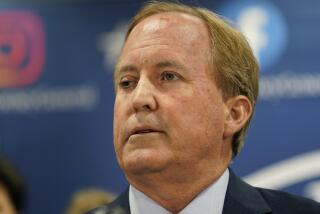SEC Files Fraud Charges Against Jett, Two Former Bosses
- Share via
WASHINGTON — The Securities and Exchange Commission said Tuesday that it will seek millions of dollars in fines against Joseph Jett and attempt to bar him for life from the securities industry, charging that the former Kidder, Peabody & Co. bond trader engaged in fraud.
In a civil administrative case filed Tuesday, the SEC alleges that Jett, the brokerage firm’s chief government bond trader, engaged in phantom trades between 1992 and 1994 to hide losses of about $83 million, allegedly creating $348 million in phony profits.
The case is the first the SEC has filed in connection with the Kidder Peabody scandal, which came to light in April 1994 with the collapse of the mortgage-backed securities market.
The SEC also filed charges against two of Jett’s former superiors, Edward Cerullo and Melvin Mullin, alleging they failed to supervise Jett.
“Historically, this is one of the most significant frauds we’ve ever charged for one of the largest trading scandals in history,” said Richard Walker, the SEC’s regional chief in New York. “We’re trying to send a message that fraudulent trading practices will be addressed, and supervisors must be vigilant to uncover fraud when red flags show potential wrongdoing.”
In addition to seeking fines of $10,000 per violation, the SEC said it will ask Jett to surrender as much as tens of millions of dollars in fraudulently earned pay, Walker said.
Jett is accused of falsely inflating profits from his trading of government bonds by causing Kidder to enter profitable trades that in fact “did not involve real trades” and “lacked any economic significance,” the SEC said.
According to the agency, Jett sought to conceal his scheme, which the SEC says generated $196 million of fictitious profits in 1993 alone, by omitting and misrepresenting key facts from superiors. It said Jett, who allegedly hid $45 million of trading losses in 1993, received a $9-million performance bonus that year.
He was dismissed by the brokerage in April 1994 shortly after the scandal surfaced and was barred from New York Stock Exchange membership in November of that year.
The scandal forced General Electric Co., which had bought Kidder in 1986, to put $200 million in capital into the firm to help support it. By December 1994, the bulk of Kidder Peabody’s assets had been sold to PaineWebber Group Inc. for $670 million.
Jett, 38, who was also charged with record-keeping violations, has consistently denied he did anything wrong.
A spokesman for Jett said Tuesday that Jett will contest the charges.
“Joseph Jett is a scapegoat who is innocent of any wrongdoing,” the spokesman said. Jett has said that his supervisors were aware of all his trading activities.
Cerullo, a former fixed-income chief at Kidder who rose to become the firm’s No. 2 executive, settled the charges against him. He agreed to a one-year suspension from working as a supervisor in the securities industry and to pay a $50,000 fine. Under terms of the settlement, Cerullo neither admitted nor denied wrongdoing, the SEC said.
The SEC will seek to have Mullin pay fines of between $5,000 and $50,000 per violation and attempt to bar him for an undetermined period from acting as a supervisor in the securities industry, said Walker, who is soon to become the SEC’s general counsel.
Mullin, who was fired in August 1994, will contest the charges, his attorney has said.
Mullin has previously denied any knowledge of the alleged trading fraud.
Walker said that once Jett formally contests the charges, a preliminary hearing before an SEC administrative judge could begin within a month.
More to Read
Inside the business of entertainment
The Wide Shot brings you news, analysis and insights on everything from streaming wars to production — and what it all means for the future.
You may occasionally receive promotional content from the Los Angeles Times.










